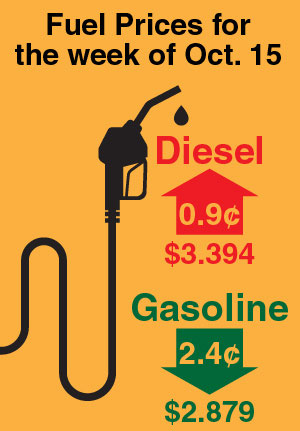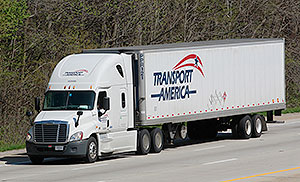Senior Reporter
Diesel Inches Up 0.9¢ to $3.394 in Eighth Straight Increase

Diesel prices continue to move higher, increasing 0.9 cent to $3.394 per gallon, according to the weekly survey by the U.S. Department of Energy on Oct. 15.
The cost of trucking’s primary fuel rose by less than a penny compared with the previous week’s 7.2-cent surge, but diesel prices still have risen for eight consecutive weeks. The cost of the fuel has increased a total of 18.7 cents since Aug. 20.
Compared with a year ago, diesel prices are up by slightly more than 60 cents a gallon.
Prices moved higher in all but one region, with the Lower Atlantic posting the largest gain — 2.9 cents to $3.272.

California’s price of $4.109 is the highest in the nation despite a 0.2-cent drop.
Midwest prices were unchanged at $3.351.
The cost of unleaded regular gasoline, meanwhile, took a downward turn. The average cost of a gallon fell 2.4 cents, with a 6.4-cent decline in the Midwest being the most sizable.
Diesel now is selling at the highest price since Dec. 15, 2014, and prices are up 71.4% since a low of $1.98 per gallon in February 2016.
EDG Group Senior Economist Paul Bingham told Transport Topics that on a scale of 1 to 10, the rising price of diesel is a 4. That’s because fuel inflation will mean higher shipping costs that eventually will be passed along to the consumer.
“It is going to impact more than just trucking because it is going to impact the railroads and everyone who is consuming energy,” he said. “It even impacts consumers as a whole. If they have to spend more of their disposable income on gas at the pump, then they have less to spend on the goods that the truckers are being hired to haul around.
“Energy price inflation is a contributor to a weakening economy for everybody else in terms of higher costs they have to pay for their fuel, and less leftover disposable income to spend on other things, if people have to spend more on the motor fuels.”
The price of West Texas Intermediate crude oil, the benchmark of the industry, closed Oct. 16 at $71.92 a barrel, down $3.04 from Oct. 9. However, it is $21 a barrel more expensive than it was a year ago, when WTI closed at $50.92 a barrel Oct. 10.
The higher cost of diesel fuel is causing many fleets to explore ways to conserve. Eagan, Minn.-based Transport America has a fleet of 1,500 trucks, and it uses a fuel-optimizer program to manage fuel purchases and costs. The carrier also urges drivers to spend as little time as possible idling their trucks.
“We’re putting in some bonuses to encourage that behavior, because when you have some economies of scale to purchase those gallons at specific places, it can make a difference in the cost and a substantial savings,” Vice President of Safety and Security Lisa Gonnerman told Transport Topics. “Long periods of idling, it’s just the fuel going up the stacks.”

A Transport America truck on the highway. (John Sommers II for Transport Topics)
Transport America is owned by Montreal-based TFI International, which ranks No. 9 on the Transport Topics Top 100 list of largest for-hire carriers in North America.
One executive for a for-hire truckload carrier that operates nearly 90 compressed natural gas trucks said an in-cab design change made fueling those vehicles much easier.
Before the change, a driver had to figure how much farther to drive, get out and look at the gauge measuring the pounds per square inch, an indication of how much CNG was in the tank, “and then have to do the math in their head to determine if they needed to fuel now,” said Curt Reitz, president of Green Bay, Wis.-based Contract Transport Services.
Then, in 2017, Agility Fuel Solutions introduced its Blue iQ fuel system that links with proprietary engine data on Cummins’ natural gas engines.
Blue iQ’s dashboard has a vehicle range monitor to determine how far drivers can go with the fuel on board, an eco-mode to help avoid unplanned refueling at low fuel levels and a limp-home mode to get drivers safely out of traffic at extremely low fuel levels, according to the company.
Contract Transport Services’ fleet consists of 133 tractors, 86 of which run on CNG. The fleet’s average length of haul is 166 miles, primarily to serve the paper industry.
“We do have another 15 of the new CNGs coming in November and another 10 in February. So that is going to get us to about 111 CNG trucks out of 133,” Reitz said.
By the end of 2019, the company plans to have 100% of its tractors run on CNG, according to its website.
Among the benefits of using CNG, he said, are stable fuel cost, alternative fuel tax credits and longer customer contracts,
Staff Writer Daniel P. Bearth and Staff Reporter Roger Gilroy contributed to this story.

